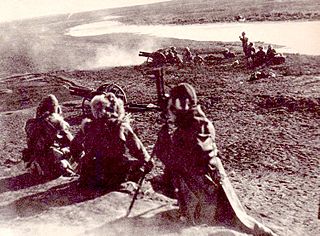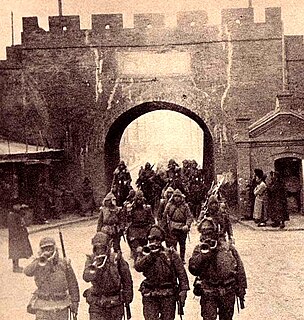
The Soviet invasion of Manchuria, formally known as the Manchurian Strategic Offensive Operation or simply the Manchurian Operation, began on 9 August 1945 with the Soviet invasion of the Japanese puppet state of Manchukuo. It was the last campaign of the Second World War, and the largest of the 1945 Soviet–Japanese War, which resumed hostilities between the Union of Soviet Socialist Republics and the Empire of Japan after almost six years of peace. Soviet gains on the continent were Manchukuo, Mengjiang and northern Korea. The Soviet entry into the war and the defeat of the Kwantung Army was a significant factor in the Japanese government's decision to surrender unconditionally, as it made apparent the Soviet Union had no intention of acting as a third party in negotiating an end to hostilities on conditional terms.
This article is concerned with the events that preceded World War II in Asia.

Lytton Report are the findings of the Lytton Commission, entrusted in 1931 by the League of Nations in an attempt to evaluate the Mukden Incident, which led to the Empire of Japan's seizure of Manchuria.
The Beijing–Harbin railway, named the Jingha Railway, is the railway that connects Beijing with Harbin, the capital of Heilongjiang Province. It spans 1,249 km (776 mi). It is a very prominent route in the provinces of northeastern China.

The Resistance at Nenjiang Bridge was a small battle fought between forces of the Chinese National Revolutionary Army against the Imperial Japanese Army and collaborationist forces, after the Mukden Incident during the Invasion of Manchuria in 1931, prior to the start of the Second Sino-Japanese War. It marked the start of the Jiangqiao Campaign.

The Northeastern Army, was the Chinese army of the Fengtien clique until the unification of China in 1928. From 1931 to 1933 it faced the Japanese forces in Manchuria, Jehol and Hebei, in the early years of the Second Sino-Japanese War.

Zhang Jinghui ; was a Chinese general and politician during the Warlord era. He is noted for his role in the Japanese puppet regime of Manchukuo in which he served as its second and final Prime Minister.

The Jiangqiao Campaign was a series of battles and skirmishes occurring after the Mukden Incident, during the invasion of Manchuria by the Imperial Japanese Army, prior to the Second Sino-Japanese War.
The Defense of Harbin occurred during the early Second Sino-Japanese War, as part of the campaign of the Invasion of Manchuria by forces of the Empire of Japan from 25 January to 4 February 1932.

The Jinzhou (Chinchow) Operation was an operation in 1931 during the Japanese invasion of Manchuria, which was a preliminary, contributing factor to the outbreak of the Second Sino-Japanese War in 1937.

The Pacification of Manchukuo was a Japanese anti-insurgency campaign during the Second Sino-Japanese War to suppress any armed resistance to the newly established puppet state of Manchukuo from various anti-Japanese volunteer armies in occupied Manchuria and later the Communist Northeast Anti-Japanese United Army. The operations were carried out by the Imperial Japanese Kwantung Army and the collaborationist forces of the Manchukuo government from March 1932 until 1942, and resulted in a Japanese victory.
Feng Zhanhai or Feng Chan-hai, 冯占海,(1899–1963), was one of the leaders of the volunteer armies resisting the Japanese and the puppet state of Manchukuo in Manchuria. Feng was born on November 6, 1899. At eighteen he joined the Dongbei Army, and later entered a military school graduating in 1921. After he graduated, he was successively a platoon leader, company commander, and battalion commander. At the time of the Mukden Incident and invasion of Manchuria he was a colonel commanding a regiment of the Kirin Guards Division.
Yu Chung-han, a prominent civilian politician of Zhang Xueliang's Northeastern government, who favored the autonomy of Manchuria and aided Japan's establishment of the puppet state of Manchukuo.
The Northeast People's Anti-Japanese Volunteer Army was led by Tang Juwu, formerly the commander of a Northeastern infantry regiment, interned by the Japanese at the beginning of the invasion of Manchuria. It was created by the Northeast National Salvation Society that had appointed Tang as commander following his escape from the Japanese, and helped him link with the local forces which others were organising. Tang also made use of his personal contacts with police chiefs, officials, local gentry militias and the leaders of the Big Swords Society. Tang was able to organize a force which threatened the region to the east of Mukden and communications with Korea.

Yoshitsugu Tatekawa was a Lieutenant General in the Imperial Japanese Army in World War II. He played an important role in the Mukden Incident in 1931 as Major General and he concluded the Soviet–Japanese Neutrality Pact in 1941 as ambassador to the Soviet Union.

Yuan Jinkai, was a politician in the late Qing Empire, serving subsequently under the Beiyang Government and the Fengtian clique, subsequently becoming a cabinet minister in the Empire of Manchukuo.

Lu Ronghuan, was a politician in the early Republic of China who subsequently served in a number of Cabinet posts of the Empire of Manchukuo.
The Russian invasion of Manchuria occurred in the aftermath of the First Sino-Japanese War (1894–5) when concerns regarding China's defeat by the Japanese and the latter's occupation of Manchuria caused the Russians to speed up their long held designs for imperial expansion across Eurasia.













